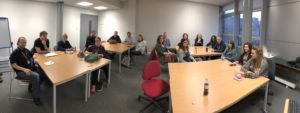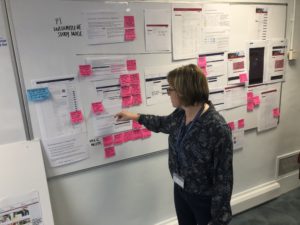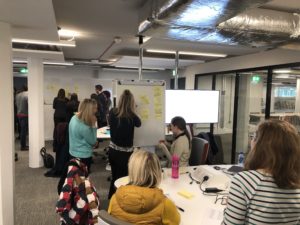Monthly lookback 1: November December 2019
I’ve decided to set myself the target of writing a monthly review. We may only be a little over three months into the set up of a new team and service but already things are moving so quickly. So for me, it’s important to regularly take stock of what we’ve achieved and reflect on where we’re heading.
I’ve been inspired by the openness of a number of digital leaders in the public sector. For example, Matt Edgar at NHS Digital manages to do a lookback weekly, which I think is an amazing commitment to transparency and communication.
Given that December has been a short working month, and I only decided to do this over the Christmas holiday, my first lookback is considering both November and December 2019. I’ll no doubt evolve the format as we go forward, so please leave a comment if you like this approach or would like to see it done differently.
What have we been doing?
We’re in the early stages of setting up and refining our operation. People have been coming on board and we’ve been dealing with the logistics of this, along with the inevitable teething problems that come with a newly developed office space. We’ve welcomed three more editors to the team that bring us up to our full complement on the content design front: Sophy Dale, Ari Cass Maran and Lauren Tormey.
I spent the early part of November refining my evolution of the project plan and vision for the Service, with support from Service Excellence colleagues Shirley Williams (our Project Manager) and Rich Dodgin (our Business Analyst) and guiding feedback from my boss Niall Bradley, Emma Rowson (who oversees the Service Excellence programme our team sprang from) and Fraser Muir (who sponsored that project). Delivering that paper was fundamental to getting the go ahead for the approach we’re now taking (working agile, following the University’s Digital Experience Design Standards).
The presentations I subsequently gave at roadshow sessions is based on that paper, and goes into more detail on things web publishers and marketing and recruitment colleagues had been asking.
Team intro presentation: slides, video and transcript
Two sprints were completed during this time, which delivered: user research around postgraduate student and staff experiences, set up for events in December and January, logistical planning and comms for Gather Content pilot for the UG Degree Finder refresh.
Sprint write ups – summaries of what we’ve been doing in each two week block of activity
We took advantage of the postgraduate open days that happened in November, by getting everyone in the team out and about engaging with staff and students. Gayle and I trained the team in how to conduct usability testing before throwing everyone in at the deep end to record as many students as possible attempting top tasks on the website. This was a tremendous success with over 40 usability test recordings captured.
Postgraduate Open Day usability testing activity write up
We also found time for our first team cross-fertilisation session, which brought our team together with Website and Communications from Information Services (where Lauren and I hail from) and Digital Marketing from Communications and Marketing (where Laurie joined us from). Learning what everyone does, and what they’re working on is so important in a devolved and ever changing environment such as ours. We shared lightning talks, informal follow up chats and a trip to the pub which we all agreed was a great way to build new working relationships.

Colleagues from Digital Marketing and Website & Communications came together to share lightning talks on responsibilities and current priority projects.
We kicked off the engagement process of refreshing the undergraduate prospectus which will go live in February 2020. There has been a lot of change this year; the print prospectus significantly changed and decoupled from the digital update process, our new team took over responsibility, and we introduced a new tool for engagement. All this contributed to a delayed start to the process, but with some efficiency savings, a bigger team and a lot of goodwill and hard work from colleagues in schools we are pretty much on track.
The response to the introduction of GatherContent as our engagement and content management tool (replacing emailing documents back and forth) has been overwhelmingly positive with most collaborators across schools making it to the training and intro sessions we hosted with the support of the GatherContent team.
Undergraduate degree finder update communications
I’ve also been working with Steven Ross and colleagues in Information Services to produce an options analysis on the future of the Degree Finder content management system. The technology is approaching end of life which practically for me means that it can no longer be developed and enhanced. As well as contributing to this technical piece of work, I spent time liaising with a range of colleagues to produce a discussion paper around the future of business critical content management.
What have we learned?
We are a new team and bring together a range of experience and backgrounds. As such everyone has been learning a lot from and about each other. We’ve also had to dedicate time to aligning around our agile development practices and familiarising with human-centred design. We’re trying to weave in as much personal development as we can in amongst our priorities, learning by doing and growing together. Doing things for the first time can be slow, and involve some missteps, but with every sprint I see the team speeding up and growing in confidence.
We were also fortunate to be able to welcome a colleague from Dundee to talk about their recent experiences in using human centred design sprints to rapidly deliver a new prospective student web presence.
Dundee University web team blog posts on design sprints
We’ve had to get up to speed pretty quickly with GatherContent to enable the engagement with schools and colleges on the update of the prospectus. Laurie has been doing a sterling job (with support from colleagues she left behind in Digital Marketing) to get the editorial team fully engaged and contributing to the review of degree finder content.
Blog posts on using GatherContent to update the Undergraduate Degree Finder
We’ve learned a lot about the workings of other key areas of the University. In particular, Website and Communications have been supporting us in a number of ways: from web strategy briefing to editorial style guides and design standards. Working to measurable quality standards is in my view critical, if we are to deliver better student experiences and provide leadership in online provision to colleagues across the University.
University of Edinburgh Digital Experience Design Standards
We’ve begun researching search terms used by prospective postgraduates using a methodology Duncan MacGruer and I piloted a number of years ago. With his support we’ll be directly influencing website search results in the new year and improving student experiences.
Testing website search for relevancy and precision – A LIst Apart
Most importantly, we’ve been learning about the prospective student experience around fees from a wide range of sources. Members of the team have been recording students completing top tasks online, reviewing Google Analytics data, interviewing admissions staff, observing day-to-day activity at student help desks, analysing email enquiry logs and auditing key website content.
It’s our UX specialist Gayle’s task to pull all this insight together into a coherent narrative so we can prioritise the biggest issues to address with Fees Service colleagues early in the new year.

Our UX Specialist Gayle Whittaker is collating a wide range of user research and analysis undertaken by the team during December.
What have we delivered?
We designed and executed three roadshow sessions to introduce the team, our ways of working and our priorities. These sessions were very well attended and received, and enabled us to engage directly with colleagues in marketing, recruitment and web management roles.
Team intro presentation: slides, video and transcript
These sessions also included workshops that have enabled us to better understand the priorities our colleagues would like to see us address. I designed the sessions to focus on student behaviours we’d like to change, rather than to comment on websites. Ultimately, our success will be measured in what students do, not on how many web pages we have. We’re now analysing this data and aligning it with what we already know about student priorities.

Over the course of three sessions, over seventy colleagues contributed to prioritisation workshops.
The usability research we undertook at postgraduate open day generated more than thirty videos of students attempting top tasks around fees and funding. These recording have fed into our discovery work for the Fees Service, and enabled us to promote open usability review sessions that empower colleagues across the University to help prioritise what we fix first.
Join us to review student usability sessions in January
We’ve also delivered a new framework for degree finder content review through GatherContent, including communications and training events to enable colleagues to get involved.
Blog posts on using GatherContent to update the Undergraduate Degree Finder
What did you think of this lookback blog post?
Useful? Interesting? Pointless? Boring?
I’d love to hear what you thought. Please spare a moment to leave a comment.



